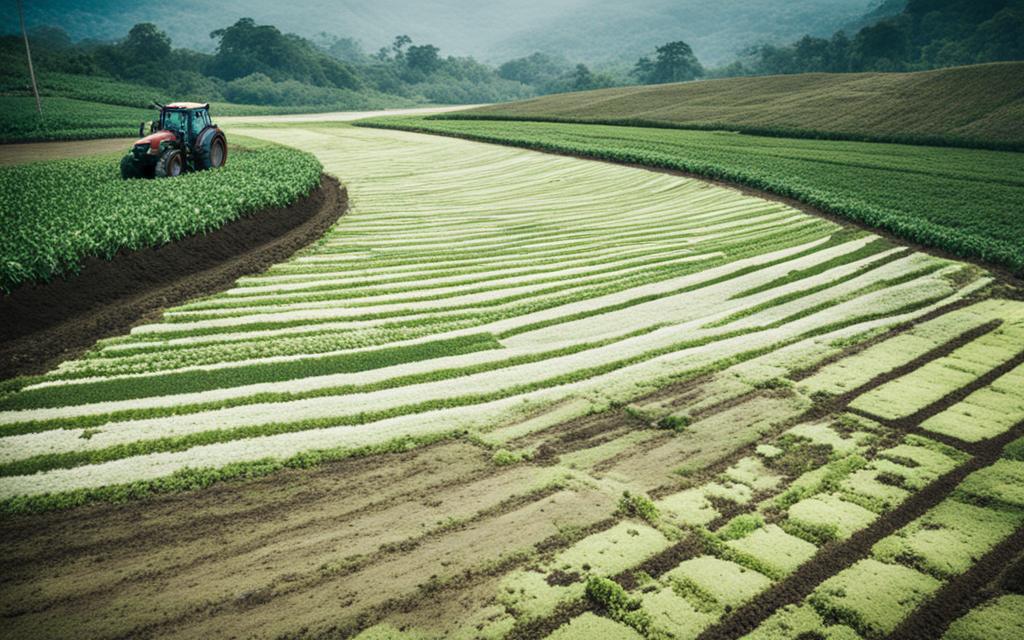Costa Rica is tackling the issue of too many pesticides head-on. It’s introducing new laws to deal with the problem. Kattia Cambronero, a member of the PLP party in Congress, is leading the charge. She aims to stop the use of 17 dangerous chemicals identified by the OECD. Plus, she wants to make rules tougher for using pesticides in general.
When it comes to using pesticides, Costa Rica is at the top. It uses more per field than any other country. The FAO says Costa Rica uses 23.44 kilograms of these chemicals for every field. This is a big worry, leading the government to do something about it. They’re focusing on places that grow bananas, coffee, and pineapples.
Key Takeaways
- Costa Rica is tackling the problem of excessive pesticide usage through innovative legislation.
- A proposed bill aims to ban 17 hazardous agrochemicals and regulate the general use of pesticides.
- Costa Rica is the world’s highest consumer of pesticides per hectare, using 23.44 kg per hectare according to FAO data.
- The legislation seeks to address the urgent issue of agrochemical overuse in the country’s banana, coffee, and pineapple industries.
- The bill represents a significant step towards promoting sustainable agriculture, environmental protection, and public health in Costa Rica.
Costa Rica’s Alarmingly High Pesticide Usage
Costa Rica is known for taking care of nature and thinking about the future. Sadly, it uses lots of pesticides. The Food and Agriculture Organization of the United Nations (FAO) says it’s the top country in the world for this. This means it uses the most pesticides for every area of land.
Data from FAO Reveals Concerning Statistics
The latest data shows that every hectare of land in Costa Rica uses 23.44 kilograms of chemicals. This number has gone up a lot since 1996, especially in growing bananas, coffee, and pineapples. Using too many pesticides is bad for the environment, and changes can harm animals and plants.
Costa Rica’s focus on strict rules for pesticides brings up worries. It’s about keeping people healthy, making sure food is safe, and being kind to the earth. These worries show how important it is to find new ways in farming that use less chemicals.
“The overuse of pesticides in these crucial agricultural industries poses a significant threat to the environmental protection, biodiversity conservation, and ecological balance of the region.”
Costa Rica wants to be a model for taking care of bugs and the environment together. To make farming better for everyone, it needs to deal with the problem of too many pesticides. This means looking for new ways in farming that aren’t bad for people or the planet.
Impact on Public Health and Environment
The excessive use of pesticides in Costa Rica is a big health issue. People are getting sick, and cases of stomach cancer are going up in the Cartago province. This place is famous for farming. A recent UNDP report shows that chemicals are polluting the Sixaola river basin. This means the environment is suffering a lot because of the pesticides.
Pesticides don’t just harm people. They also mess up the balance of nature and its variety of life forms in Costa Rica. These dangerous chemicals end up in the water and soil, affecting everything they touch. This messes with the country’s ecosystems, which are usually vibrant and diverse.
“Pesticide exposure has been linked to a range of health issues, from respiratory problems to hormone disruption and cancer. We must act now to protect the health and wellbeing of our citizens and the environment they depend on.”
Costa Rica knows it must act fast. It wants to stop the harm to both the environment and people. So, it’s working on new laws for safer farming and better ways to manage pests. These include using fewer chemicals and more organic methods.
Costa Rica plans to lead by example in managing pesticides. It’s making sure its food is safe and its nature is protected. This effort shows how a country can grow without hurting the earth. It’s all about taking care of what we have for the future.
Congresswoman Kattia Cambronero’s Proposed Legislation
Congresswoman Kattia Cambronero is leading a big effort against agrochemical overuse in Costa Rica. She is pushing for a major law change. This bill will stop using 17 harmful pesticides. It will also make using all pesticides safer in the country.
Cambronero says it’s time to act because other countries have already banned these 17 pesticides. Her law is all about keeping Costa Ricans safe and protecting nature. It fits with the nation’s goal to farm in ways that don’t harm the Earth.
Banning 17 Hazardous Pesticides and Regulating Usage
Key parts of Cambronero’s bill are:
- Stop using 17 dangerous pesticides as marked by the OECD.
- Make using pesticides safer by setting stricter rules.
- Promote ways of farming that are kind to the environment.
- Make sure food and nature are safe by watching pesticide use closely.
Cambronero’s bill is a strong move towards a better, greener way of farming in Costa Rica.
“It is our responsibility to protect the health of our citizens and the integrity of our environment. This legislation is a crucial step in that direction.”
– Congresswoman Kattia Cambronero
| Banned Pesticides | Rationale |
|---|---|
| Chlorpyrifos | Neurotoxic effects, especially on children |
| Paraquat | Highly toxic, linked to Parkinson’s disease |
| Glyphosate | Probable carcinogenic effects, environmental concerns |
| Atrazine | Endocrine disrupting properties, water contamination |
Outdated Pesticide Regulations in Costa Rica
Even though Costa Rica is increasing its efforts, the rules on pesticides are not keeping up. Congresswoman Kattia Cambronero is pushing hard to update these rules. She knows it’s urgent.
Cambronero points out that Costa Rica’s pesticide laws are almost 20 years old. They are not ready for the changes in farming. “The old laws about pesticides are worrying. We need to update them to keep food safe, help people stay healthy, and protect our nature,” she says.
Her plan is to stop the use of 17 dangerous pesticides. She also wants to make tougher rules for the rest. This move will help protect the environment. It will also push for farming that is kind to the earth in Costa Rica.
“The backlog of outdated pesticide laws is a significant concern that must be addressed to ensure food safety, protect public health, and conserve the country’s rich biodiversity.”
The high use of chemicals is a big red flag for Costa Rica. The FAO’s data shows this. These numbers show why Cambronero’s plans are so important. They aim to protect nature and health while keeping the farm business going.
Costa Rica is working hard to be a top name in eco-friendly farming. Updating the rules on pesticides is key to this effort. It’s all about saving nature, health, and our future food.

Costa Rica Addresses Agrochemical Overuse with Innovative Pesticide Legislation
Costa Rica is taking a big step to cut down on excessive pesticide use. This push is through new legislation designed for sustainable farming and to protect the environment. Congresswoman Kattia Cambronero is at the forefront of this move.
They are focusing on the high use of pesticides in the banana, coffee, and pineapple sectors. The goal is to stop using 17 harmful pesticides. This step follows guidelines from OECD nations, showing Costa Rica’s concern for its people and nature.
The new law aims to control the use of pesticides in the whole country better. It hopes to stop the widespread use of agrochemicals. This situation has worried both environmentalists and health experts for a while now.
This action is key for Costa Rica’s effort towards farming sustainably and protecting its environment. It wants to be a model for managing agrochemicals. Doing so will make its farming stronger and better for the earth and biodiversity.
“This legislation is a game-changer in our quest to address the pressing issue of agrochemical overuse. It represents a bold step towards safeguarding our environment, protecting public health, and promoting the long-term viability of our agricultural practices.”
This new law doesn’t just ban certain dangerous pesticides. It also aims to manage all agrochemical use more carefully. This shows Costa Rica’s move towards better pest control that respects nature.
By tackling past pesticide problems, Costa Rica’s looking into a better, greener future. It aims to change how farming is done, for the benefit of its environment. This step hopes to inspire other countries to do the same.
Promoting Sustainable Agriculture and Organic Farming
Costa Rica is making waves by focusing on safe, sustainable agriculture. It is working towards banning harmful pesticides. At the same time, it is pushing for the growth of organic farming. This dual action tackles the issue at its core. It also promotes the use of more eco-friendly solutions.
Incentives for Alternative Pesticide Production
The country’s proposed plans include help for developing better, safer farm methods. They offer support for creating alternative pesticides like biopesticides. These are safer for both people and the earth.
Costa Rica is actively urging farmers to go organic. This is a move to safeguard the environment and keep food safe. It matches the country’s strong environmental goals. Plus, it’s part of its plan for a more sustainable future.
| Incentive Measure | Objective |
|---|---|
| Research and Development Grants | Spur innovation in alternative pesticide production, focusing on biopesticides and organic compounds |
| Technical Assistance Programs | Provide farmers with training and resources to adopt sustainable farming practices and integrated pest management |
| Tax Incentives | Encourage companies to invest in the manufacture of eco-friendly pesticide alternatives |
Costa Rica’s focus on better farming methods is about more than just cutting back on pesticides. It is all about keeping people, nature, and our food safe. It’s part of a larger plan to make farming stronger and more eco-friendly. This will help both the planet and our wallets.
“The proposed legislation marks a big step for Costa Rica in caring for the environment and food safety. By boosting the production of safer pesticides and promoting sustainable practices, we’re building a more stable and green farming industry.”
– Kattia Cambronero, Costa Rican Congresswoman
Contamination of Sixaola River Basin
The Sixaola River Basin in Costa Rica faces a big problem. It’s polluted with pesticides. This issue calls for strong laws to stop the country’s excessive use of agrochemicals. A report by the United Nations Development Programme (UNDP) outlined the crisis and urged for change. The report stressed that Costa Rica needs to adopt sustainable farming and regulate pesticides better.
The area around the Sixaola River is vital for many plants and animals. But, it has been heavily polluted by pesticides. This pollution is not only dangerous for the local wildlife. It also puts people’s health at risk.
The UNDP’s findings are a warning about the dangers of using too many agrochemicals. This pollution doesn’t just affect the local people’s jobs. It also shows that Costa Rica must do more for the environment and sustainable growth.
“This issue is not just an environmental concern, but a matter of public health and food safety that requires immediate legislative action,” stated a spokesperson from the UNDP.
To fix the problem, Costa Rica needs new rules about pesticides. It should stop using dangerous chemicals. Instead, it should encourage farming in ways that are good for the planet. The government can help by promoting safe farming and supporting the creation of friendly alternatives. Doing so would help protect the Sixaola River Basin, its animals, and people’s health.
The UNDP’s report highlights how important new pesticide rules are. These laws aim to make Costa Rica’s farming sustainable. By fighting agrochemical overuse, the country can focus on keeping its environment safe. This way, the Sixaola River Basin and other special places can thrive. Biodiversity and health will get the protection they need.
Economic Concerns Raised by Agriculture Minister
Costa Rica is tackling the overuse of agrochemicals with new pesticide laws. The debate highlights the need to balance protecting the environment with economic needs. Minister Victor Carvajal worries that the focus on the environment might ignore important money matters.
Carvajal’s view shows how lawmakers need to balance things carefully. They want to protect public health, biodiversity, and ecological balance. But, they also want to keep Costa Rica’s farming sustainable. The minister says we need a full plan. It should think about how pesticide rules affect food safety, integrated pest management, and organic farming initiatives.
He’s worried because the issue is not simple. The new laws aim to fight overuse of chemicals. But they also want to boost eco-friendly farming. In this debate, policymakers must consider the money side as well as important environment and health issues. They need to make a choice that’s good for everyone.
“The balance between environmental protection and economic considerations will be a key factor in the debate surrounding the new pesticide regulations.”

Bipartisan Support for Pesticide Regulation
A new law is on the table in Costa Rica to deal with too much use of agrochemicals. Lawmakers from all political sides are showing their support. Montserrat Ruiz, a member of the National Liberation Party, is behind Congresswoman Kattia Cambronero’s efforts. They believe it’s vital for the nation and its farmers.
Ruiz points out that this plan isn’t just about saying no to things. It’s about helping farmers switch to methods that are better for the earth. Everyone working together on this shows they know that solving the pesticide problem needs everyone’s help.
This backing for a greener way of farming is a big deal. It shows people from all sides of politics care about sustainable agriculture, environmental protection, and public health. Together, they aim to make Costa Rica a place where organic farms and biodiversity are big priorities. This will set a good example for taking care of nature well. Everyone gains when nature wins.



